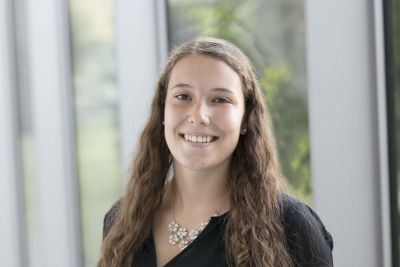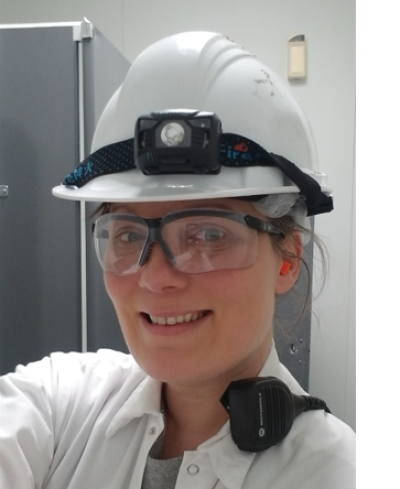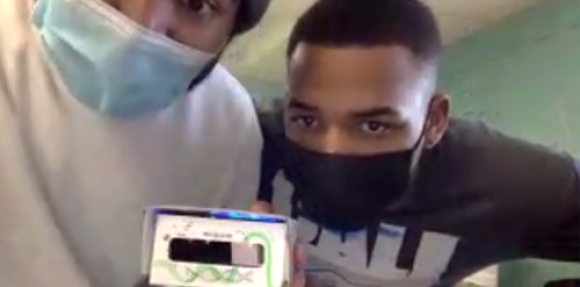It can take just one person to open a student’s eyes to new possibilities: That’s a common theme that emerges when speaking with professionals of all types about how they discovered their career paths. And nowhere is that truer than in STEM fields, especially for youth from underserved and underrepresented populations. That simple premise underpins much of the volunteering that occurs in ABE classrooms—the idea that one encounter can help a student see new pathways.
“Having someone who reaches out to you and says ‘Hey, this exists, this is something that you could do if you want to do it’ really resonates with me and other early career professionals,” says Dariana Brazil, an engineer who works at Amgen in Rhode Island, where she heads up outreach work for the Amgen Early Career Professionals (AECP) group. “It took just a couple of people doing that for us to help get us into this industry. So being able to take part in events at local schools, to show students what they could eventually be, really hit home for me.”

Through her role as VP of external relations for the AECP group, Brazil learned about work that had started in San Francisco when COVID-19 hit to reach students in underrepresented communities with at-home biotech lab kits. Based on the success of that program, Brazil and colleagues put together a two-part virtual program for local Rhode Island schools, with the first part being a series of speakers discussing their paths in biotech and the second part being a miniPCR lab kit that volunteers would lead students in remotely.
Central Falls High School was the first to participate in 2021, followed by Dr. Jorge Alvarez High School in 2022. “The students overall absolutely loved the program that we had,” Brazil says. “It was really well received.” When the program started in the middle of the pandemic, many of the students’ questions to panelists focused on how the work they were doing in biotech translated to helping with public health emergencies, like helping to create COVID-19 vaccines.
The miniPCR kits they used were effective in both giving the students an introduction to DNA and also in simply teaching them to follow lab-style instructions. Michell Leech, a chemical engineer at Amgen, was one of the volunteers who helped the students set up the kits. “The students seemed really excited about what was going on in putting the kits together,” she says. “And that's exciting to me, because that's an engineering-type thing—to be excited about putting things together and figuring out how it works.”

Working with Leech and other STEM professionals also gave the students a chance to directly interact with scientists and engineers, which can be a powerful gateway to wanting to learn more. Leech still takes advantage of similar opportunities in her own career. While she has a chemical engineering background, for example, she has been taking biotech classes online to learn more about the industry.
Leech’s personal drive to volunteer stems from her childhood growing up 30 miles from Pittsburgh, attending high school in an underserved community. “We didn't have as many opportunities as someone who was closer to the city or at a better school,” she says. “So, I just wanted to make sure that people have opportunities to experience STEM, because you don't know what's out there until you've experienced them.”
In Leech’s various volunteer work, including with Junior Achievement, she often finds that students do not really know what engineering is. She herself did not fully see the scope of opportunities as a chemical engineer until she completed her undergraduate degree at the University of Pittsburgh. In middle school, she wanted to be a veterinarian, as she liked chemistry and math. But she ultimately landed in engineering, after realizing she did not want to do the surgical aspects of veterinary medicine. “Now I know you can do almost anything with an engineering degree,” she says.
Brazil, also an engineer, attended Massachusetts Maritime Academy. When she started there, she knew she wanted to work in a plant of some type, but knew nothing about biotech until someone from Amgen, a Mass Maritime alumnus, gave a talk her sophomore year. She was then able to apply for an internship. Ironically, she says, that same recruiter ended up being her manager later and was the one person who opened her eyes to this new career possibility.
Brazil and Leech will be continuing their volunteer program in Rhode Island for the upcoming school year. Their goal is to really show students that there are many different ways to work in biotechnology. “It takes a massive army to manufacture these drugs,” Brazil says. “That's one of the things that we really try and stress and open students’ eyes to is that there's a place for everybody, and everybody has a place, in biotechnology.”
